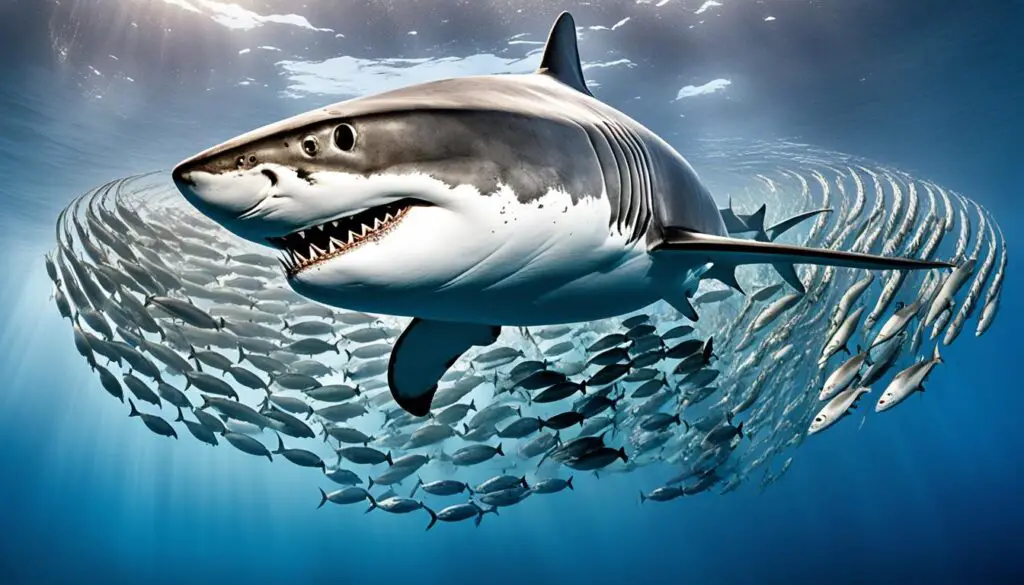Ever thought about how long sharks live? These amazing creatures have been in the oceans for about 400 million years. They’ve seen five mass extinctions and are still going strong. Sharks are not just fascinating; they play a key role in the ocean’s health.
Let’s explore how long sharks live, what affects their lifespan, and the different types of sharks out there. We’ll look into their age, importance, and the impact they have on our oceans.
Understanding Shark Lifespan
Exploring the lifespan of sharks reveals many factors at play. These include their environment, biology, and behavior. Some sharks live just a few years, while others can live for centuries. This shows how shark longevity is truly remarkable, making them some of the longest-lived marine animals.
The factors affecting a shark’s lifespan are complex. The type of shark is crucial, as some have special traits that help them live longer. Things like water temperature and where they live also matter. Plus, being hunted or competing with others can affect their life span by making them stressed and less healthy.
Learning about these factors helps us understand how some sharks can live so long. By studying their aging, marine biologists can better understand their lives and the worlds they live in.
How Long Do Sharks Live?
Sharks live different lengths of time, showing how adaptable and diverse they are. Most adult sharks live between 20 to 30 years. Some, like the great white and hammerhead sharks, can live up to 40 to 70 years.
The Greenland shark is a standout, with some living over 250 to more than 500 years. This shows how long some sharks can live.
Sharks are key to keeping the ocean’s balance. They help keep the food chain in check. But, their numbers are dropping because of us, which is bad news for the ocean. Knowing how long sharks live helps us see why we need to protect them.

Factors Influencing Shark Longevity
Sharks are fascinating creatures, and understanding what affects their lifespan is key. Many things influence how long sharks live, like the species they are, their environment, and how humans affect them. For example, sharks in cold water, like the Greenland shark, can live longer because of their unique metabolism.
How fast sharks grow and mature is also important. Sharks that grow slower often live longer. This slow growth helps them bounce back from population drops over time. It’s important to know that living a long time can make them more sensitive to environmental changes.
However, human actions are a big problem for sharks. Things like overfishing, destroying their homes, and pollution harm their populations. These issues can happen faster than sharks can recover, leading to a big drop in numbers. We need to work on protecting sharks to keep them and our oceans healthy.
| Factor | Description |
|---|---|
| Species | Differing lifespans based on specific species adaptations and metabolic rates |
| Environmental Conditions | Sharks in colder waters can live longer due to metabolic advantages |
| Growth Rates | Slower growth leads to longer lifespans and a greater vulnerability to over-exploitation |
| Human Impacts | Overfishing and habitat destruction threaten natural populations |
Shark Species and Their Life Expectancy
Learning about the life spans of different sharks helps us understand their health and conservation needs. The wide range of lifespans shows how fascinating these creatures are.
Greenland Shark Longevity
The Greenland shark is one of the longest-living animals, with some living up to 500 years. Their slow metabolism lets them live in cold waters and adapt to changes in their environment.
Great White Shark Lifespan
Great white sharks live about 40 to 70 years, much longer than thought before. They grow slowly, making them vulnerable to overfishing and affecting their numbers.
Other Notable Shark Species
Many shark species have different life expectancies:
- Whale sharks live 70 to 100 years.
- Tiger sharks can live from 27 to 50 years.
Each species’ life span is closely linked to its role in the ecosystem and the challenges it faces.
The Shark Aging Process
The way sharks age is really interesting and different from other sea creatures. Sharks, especially the Greenland shark, stay strong and healthy for a very long time. They can live up to 200 years, which is much longer than many thought possible.
Sharks live in cold water and don’t move much. This helps them live longer. The cold water and slow movement make their metabolism slower. This is why sharks can live so long.
Learning about how sharks age is important for saving their kind. By understanding how long sharks live, we can help protect them. This way, sharks can keep living in our oceans for many years.
FAQ
How long do sharks typically live?
Sharks usually live between 20 to 30 years. Some, like great white sharks, can live up to 40 to 70 years. The Greenland shark is special, living from 250 to over 500 years.
What factors influence shark longevity?
Many things affect how long sharks live, like their type and the water they live in. For example, the Greenland shark lives longer in cold water because it has a slower metabolism.
Do all shark species age the same way?
No, sharks age differently. Some sharks don’t show aging signs like humans do. This makes understanding aging in sharks more complex.
How can understanding shark aging contribute to conservation efforts?
Knowing how sharks age helps us see what threats they face, like overfishing and harming their homes. This info is key for saving sharks and keeping the ocean healthy.
Why is it important to study shark lifespans?
It’s key to study shark lifespans because they are crucial for the ocean’s health. By understanding their lives, we can protect them from dangers that could hurt their numbers.
What is the lifespan of a whale shark?
Whale sharks live about 70 to 100 years. This makes them one of the longest-living sharks. Their long lives help them play a big role in the ocean.







